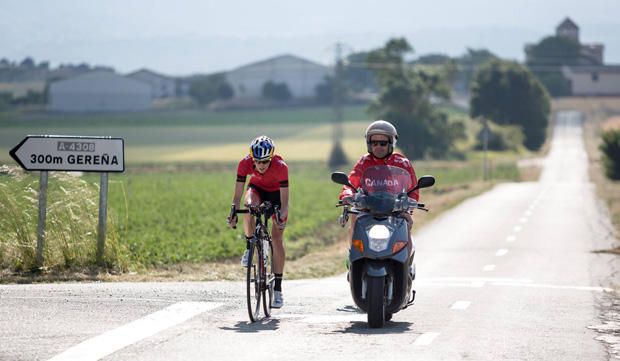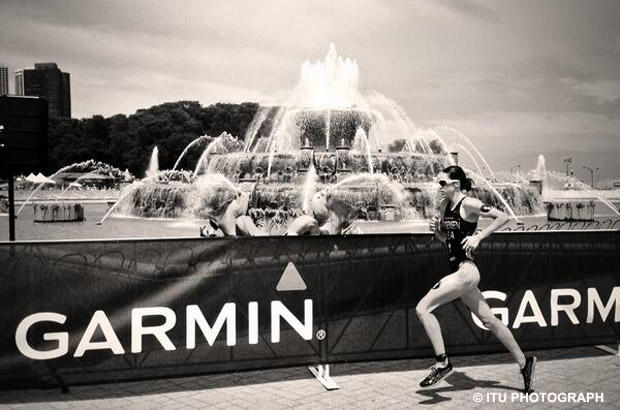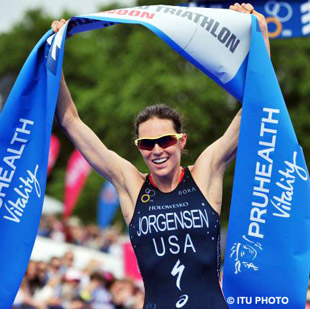Gwen: How far can she go?
America's Gwen Jorgensen enters the favorite in every Olympic-format triathlon she's in, because nobody can outrun her. Furthermore, almost no one can remain in front of her without at least a minute gap off the bike. Gwen has very few weaknesses, and the swim is not among them. She exits the water not far back from the front swimmers. She is mortal, but not substandard, on the bike. And then oh, that run.
The U.S. has had great luck with its Olympic triathlon women, and Gwen is the latest in an august group stretching back to the first-ever ITU World Championships. But since the first Olympic Games triathlon the top U.S. women have not often ventured up in distance to 70.3 and longer, nor have they often moved offroad. How far can Gwen's unique talent set take her? We asked Gwen about all of this, below is what she said.
There is one thing I notice about today's young Olympic-style triathletes that was not true a generation ago. During most of triathlon's run-up, from 1980 to 2000, most top triathletes in their heart of hearts would have preferred to be the world's best runner or cyclist than the world's best triathlete. Not so it seems for Lucas Verzbicas, Tony Smoragiewicz, Daniel Vertiz and others. They're very happy trying to be the best in triathlon, God bless 'em, even if they have talent suggesting bright futures as pure runners. And that seems to ring out in Gwen's responses below.
Slowtwitch: My arc covers pretty much the historic span of the sport, and when I think back at the former greats you seem a lot like Paula Newby Fraser, in that you are imperturbable, one of the guys, not high strung, not struck down by success, unburdened by the fear of losing that so often strikes those who become the favorite. Is that true or is it an illusion?
Gwen Jorgensen: I am still adapting and trying to learn from every race and experience. In college, I remember going to the 2009 Indoor NCAA Championship as a favorite. I was the Big Ten Champion in the 3k and the 5k and had high hopes of doing well at NCAAs. However, I was lapped in the 3k and finished last (16th). After this event, my coach asked if I wanted to pull the plug on the 5k; however, my determination wouldn't let me. So I tried again in the 5k the next day, but failed, again finishing last (17th), 45 seconds behind 16th place. I ran 17:05. I learned that media and being a favorite in a race can add stress, which must be managed. I am still learning every race, but am glad I appear to have it all together. I can assure you I still have a lot to learn!
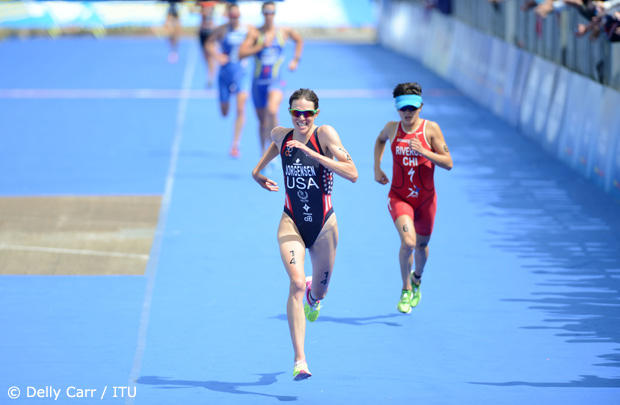
ST: I often hear about you that you’ve reached a peak as a runner, are reaching that peak as a swimmer, and you have only to work on your cycling. When I watch you run, as fast as you are, I don’t get the sense you’ve peaked as a runner. If you really are a 32:20 open 10k runner, I think I see a minute still on the table. Maybe more. While you look perfect, technically, from the waist up were you on the track against Hasay, Conley, Flanagan, I’d pick you out as having a bit of a lazy cadence for a track runner racing 1500 meters up to 10,000. Not that you should be working on generating a 62 second last quarter, that’s not your sport. But, do you and does your coach agree with any of that? Do you think you have that much more run in you?
Gwen: I'm flattered that you put me in the same category as some of the girls I watch and follow and am in awe of, especially the following: Hasay, Conley, Flanagan. Coach Jamie Turner and I work on varying velocities with some back end speed, but these workouts are focused on triathlon racing. Right now, my concern is not my run. I am trying to make my swim and bike as consistent as my run. I have noticed the stronger I get in swimming and biking, the more consistent my run is off the bike.
ST: Pursuant to that last question, do you ever think about just giving the open 10,000 a try? Not just once, like Alistair Brownlee’s 28:32 at the Stanford Invite, but, in the Olympic Trials?
Gwen: If there is 10k race that is convenient and fits into my training (much like the Sydney 10k I did) I would love to! But, you will not see me at the Olympic Trials for the 10k race in 2016.
ST: Last run question. Do you think you could whup Jordan Hasay in a 10k?
Gwen: I couldn't attempt to do what track and field athletes do on the track. They train full time for track and field. And I know from training full time for triathlon how much time, dedication and effort this takes. Flanagan's PR is two minutes ahead of mine, and Hasay has 40 seconds on my PR. When I ran 32:21 in the Sydney 10km, I was spent!
ST: What is it you haven’t done in triathlon that you’d like to do? Xterra? 70.3? Ironman?
Gwen: I would really like to win an Olympic Gold medal. I never plan to race an Ironman, but I am heading to Kona this year and am excited to view the biggest triathlon in the world. I received some great advice from a former ITU athlete this year who advised me to stay in ITU as long as possible, and that's my current plan.
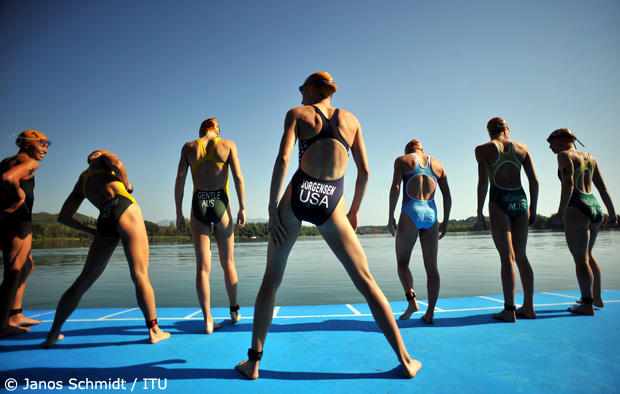
ST: If, by the time you die at the age of 95, doctors and scientists have cracked the code of the human soul and they autopsy the great Gwen Jorgensen, how are they going to describe it? “See, in her soul she was a dog person.” Or, “She was, at base, a runner.” What would their soul autopsy uncover – how would they describe you? What underpins everything?
Gwen: “There's a lot of chocolate in there!”
ST: Aside from more chocolate, what would you like to see done in triathlon right now that’s not currently done? In any part of the sport. What bugs you, or what opportunities are there that aren’t being leveraged? Opportunities for younger athletes, poorer athletes, women athletes, minority athletes, races you wish were here but aren’t here, different ways to earn money. Wide open.
Gwen: I live in the Basque region in the summer and I've been racing in local age-group draft-legal triathlons. I think the rest of the world would benefit from this platform. I am excited to see how triathlon develops in the USA as an NCAA emerging sport for women. I think this, along with some programs USAT is sponsoring (like the CRP), will enhance USA Triathlon's performance on the world stage.
ST: About the Basque region, you’re stationed in Vitoria, outside of Bilbao, yes? When I go to that part of the world, my one challenge is the hours. The Basque people are the most fun-loving people I think I have ever been around. They just seem congenitally happy, especially when on the town. The challenge are the hours they keep, for an early-to-bed, early-to-rise guy like me – dinner at 10pm just wipes me out. Am I just a pansy, and I need to harden up? Or is also a challenge to you and your enclave?
Gwen: The normal cultural hours in the Basque region are quite different from what I grew up with. My mom, dad, sister and I would often eat dinner at 4:30pm, so when I first arrived in Vitoria, I didn't understand I couldn’t make dinner reservations before 9pm. Thankfully, my training group attempts to assimilate to the culture. Jamie Turner is probably the best at assimilating. He often eats dinner at midnight. I'm not quite there yet. In order to take advantage of the gastronomical food experience in the Basque region, my day has shifted. Last year, I remember going to Hamburg and being in shock when the grocery stores were closed at 8pm.
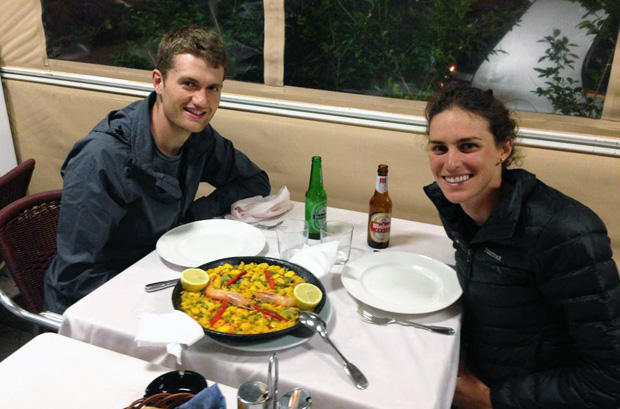
ST: Are you learning Spanish or have you learned it? Do you plan to exit this chapter of your life fully bilingual?
Gwen: In Vitoria, most locals speak Basque. Thankfully, they also understand Spanish. Patrick and I have been taking Spanish lessons; however, we haven't been able to hold a conversation at a reading level above one-year-olds, yet. It seems to be a slow process and Patrick is picking it up quicker than I am. It is more difficult to learn as well because we have such a big group of athletes who speak English, so we aren't forced to learn the language. Spanish is something I am hoping I learn.
ST: I am truly astounded by both the depth, and the consistent strength, of ITU athletes, that is, the ability to run speeds off the bike that would have been unthinkable a generation ago. Obviously ITU coaches like Joel Filliol, Jack Maitland, Darren Smith, and your coach, Jamie Turner, really are superb in the preparation of Olympic triathletes. I also note that a number of these coaches utilize the power of the “enclave” and it’s a throwback to the 1980s in San Diego and subsequently Boulder, when a lot of athletes were thrown together in one place. Can you give our readers some sense of the value or power of the enclave?
Gwen: Being in a daily training environment with other ITU athletes is beneficial. I have the unique opportunity to train with my peers (and competitors). We are usually on a similar race schedule, and trying to achieve the same goals. Jamie has done an incredible job at creating an atmosphere where we are able to push each other to improve. My belief is this raises the bar for what it takes to be competitive on the world stage.
ST: What do you see yourself doing, athletically, in the future? And I don’t mean in 5 years, I mean when you’re doing with all of this. When you’re 45 or 50? What part will athletics play in your post-professional life, or can you conceive of that yet?
Gwen: It's hard to think that far in the future, and you can never plan that far in advance. However, if I'm healthy and able, I see myself as being active. If I have a family, I'd love to do whatever sport they are passionate about. And having a healthy lifestyle will always be important.
